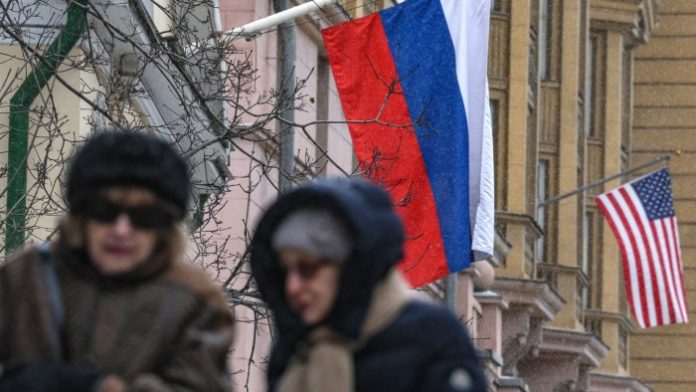The US is opposed to calling Russia the aggressor in a G7 statement on the third anniversary of Moscow’s full-scale invasion of Ukraine, threatening to derail a traditional show of unity, according to western officials.
Ukrainian President Volodymyr Zelenskyy’s participation at a virtual G7 summit on Monday has also not yet been agreed, officials said, while Italian Prime Minister Giorgia Meloni’s office announced she would not participate.
It comes after US President Donald Trump blamed Ukraine for the war, described Zelenskyy as a “dictator without elections”, and suggested that Russia should be invited back into the G7.
The Trump administration doubled down on its criticism of Zelenskyy on Thursday, with national security adviser Mike Waltz accusing Kyiv of hurling “unacceptable” insults at the US president.
The dispute over the planned G7 statement comes after Trump shocked Kyiv and its European allies by contacting Russian President Vladimir Putin and authorising bilateral talks that are aimed at ending the war in Ukraine.
Trump has flattered Putin, agreed to many of his demands regarding the war, and showed a willingness to quickly normalise Washington’s relations with Moscow.
US envoys are objecting to the phrase “Russian aggression” and similar words that have been used by G7 leaders since 2022 to describe the war in Ukraine, the officials said.
The world’s leading economies have traditionally issued a statement of support for Ukraine on February 24, the day on which Russia’s full-scale invasion started three years ago.
“We are adamant that there must be a distinction made between Russia and Ukraine. They are not the same,” an official briefed on the matter told the Financial Times.
“The Americans are blocking that language, but we are still working on it and hopeful of an agreement.”
In a further snub, a planned news conference following talks between Zelenskyy and Keith Kellogg, Trump’s special envoy for Ukraine, was cancelled after a US request, according to officials in Kyiv.
The US embassy in Kyiv declined to comment, but Zelenskyy said he had a “good conversation, full of details” with Kellogg on Thursday.
The two men discussed the situation on the battlefield, Zelenskyy said, “as well as effective security guarantees . . . We have proposed the fastest and most constructive way to achieve results”.
The change in US language on Russia marks a contrast with last year, when the country’s aggression was mentioned five times in the G7 leaders’ statement.
The 2024 statement said: “We call on Russia to immediately cease its war of aggression and completely and unconditionally withdraw its military forces from the internationally recognised territory of Ukraine.”
The Trump administration’s insistence on softening the language reflects a broader shift in US policy to describe the war as the “Ukraine conflict”, people familiar with the matter said.
Recent statements from the US Department of State use similar wording, including a readout from secretary of state Marco Rubio’s meeting on Tuesday with Russian foreign minister Sergei Lavrov in Riyadh that twice mentions “the conflict in Ukraine”.
Waltz said Trump was “very frustrated” with Zelenskyy over his perceived ingratitude for American support during the war and Kyiv’s rejection of a US proposal to take rights to half of Ukraine’s rare earth minerals.
“Some of the rhetoric coming out of Kyiv, frankly — and insults to President Trump — were unacceptable,” he added.
Waltz called on Zelenskyy to reopen talks over a critical minerals deal, after Trump suggested the US was owed $500bn worth of Ukraine’s resources in exchange for Washington’s assistance to the war torn country.
Elon Musk, the technology billionaire and Trump adviser, also hit out at Zelenskyy, and repeated the US president’s call to hold an election in Ukraine.
“In reality, he is despised by the people of Ukraine, which is why he has refused to hold an election,” he said.
Trump has falsely claimed that Zelenskyy had an approval rating in Ukraine of just 4 per cent.
A poll published this week showed the Ukrainian president enjoyed 57 per cent support at home, up from 52 per cent in December, according to the Kyiv International Institute of Sociology.
Meanwhile French President Emmanuel Macron said on Thursday that he would meet Trump in Washington in the coming days to discuss Ukraine, adding he would tell the US president to avoid being “weak” with Putin.
“How can you be credible in China if you are weak in front of Putin?,” said Macron, who has this week held talks with European leaders about how the continent should respond to Trump’s move to end the war.
Macron also said Zelenskyy had been “legitimately elected” and it would be “impossible” to hold an election in Ukraine while the war continues.
Meloni’s office said she would not join the G7 call on Monday because of a prior commitment to meet the president of the United Arab Emirates, and that Italy’s foreign minister would participate instead.
The Italian prime minister, who has been a strong supporter of Ukraine’s struggle against Russia, has appeared torn over how to respond to the escalating war of words between Trump and Zelenskyy.
She was the only EU leader to attend Trump’s inauguration, and her supporters have suggested she could be the bloc’s most effective interlocutor with the US president.
Additional reporting by Ian Johnston in Paris and Amy Kazmin in Rome




